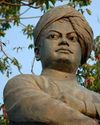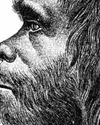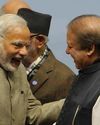Recent discoveries indicate that Neanderthals may have had a rich inner life, including symbolic thought. Indeed, they may have been the progenitors of human religions.

THE YEAR WAS 1856, three years before the publishing of The Origin of Species of Charles Darwin. In Germany, in a cave in a valley east of the river Rhine, some quarry workers discovered piles of stones which resembled human bones. Most of them were thrown away, but a few reached the hands of naturalists. They found them to be ancient and had remarkable as well as consistent differences from human skeletons. The bones remained a mystery and a controversy. Respected scientists kept a safe distance from them. Rudolph Virchow, one of the greatest biologists of his time, considered them to be merely human bones deformed by rickets. Soon similar bones and fossils were found in different parts of Europe.
The remains now termed “Feldhofer fossil of Neander valley” were studied by the fiery evolutionist Thomas Huxley, though Darwin himself maintained silence. Huxley decided that the fossils belonged to a “lower human species”. In 1863, William King, a professor of Geology at Queen’s University in Ireland, studied the fossils, though not the original fossils but the casts made of them. He decided that they belonged to altogether a new species—Homo neanderthelensis. A year later, he would think that it belonged to a lesser human ape species.
In popular perception, an image emerged from the Neanderthal debates in academic citadels. Neanderthals were viewed as a brutish, animal-like, not-so-intelligent group, either an evolutionary failure or a fleeting transition before the emergence of humans. They became part of jokes about cavemen and in popular usage a reference to the uncivilised.
This story is from the March 2017 edition of Swarajya Mag.
Start your 7-day Magzter GOLD free trial to access thousands of curated premium stories, and 9,000+ magazines and newspapers.
Already a subscriber ? Sign In
This story is from the March 2017 edition of Swarajya Mag.
Start your 7-day Magzter GOLD free trial to access thousands of curated premium stories, and 9,000+ magazines and newspapers.
Already a subscriber? Sign In

Refuging Progess
There is a well-orchestrated global conspiracy to deny scientific and technological developments from the West to Third World countries.

The Monk Of Science
Vivekananda believed that Religion should be subjected to scientific methods of investigation. The third and concluding part of our series on the Swami and his views on science.
The Next Step
Indian technical manpower can be trained for high-value-added emerging services in the era of mass commoditisation of hardware.
The Threat Of Autarchy
The force of globalisation is an irreversible reality, and it is countries like India and China that will nurture it going forward.

Neanderthals: The Womb Of Caves
Recent discoveries indicate that Neanderthals may have had a rich inner life, including symbolic thought. Indeed, they may have been the progenitors of human religions.

Getting India's World Right
Incremental concessions will get India nowhere with Pakistan and China. What we need is a classically conservative foreign policy, based on realism.

The Hesitant Orbit
In order to march boldly ahead into the deep space, New Delhi must work towards building a station, boost its techno-economic planning and use the Indian Space Research Organisation smartly.

Nudges And Narratives
The debate surrounding Sanjay Leela Bhansali’s Padmavati brings India a complex network of portraits within a cultural world-system.

The Spell Of Specialisation
THE INDIAN ADMINISTRATIVE SERVICE NEEDS AN URGENT REJIG. THE KEY TO SPEED AND EFFICIENCY LIES IN PUTTING AN END TO A GENERALIST APPROACH AND IN GOING FOR A NEW SERVICE.
The Great Gamble
With demonetisation, the prime minister has taken a huge risk— both economic and political. He must succeed, because this move could transform both our economy and our society.